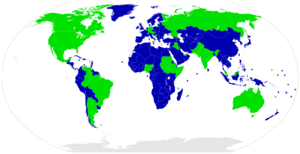Unitary state: Difference between revisions
robertparr#0 (talk | contribs) No edit summary |
robertparr#0 (talk | contribs) No edit summary |
||
| Line 2: | Line 2: | ||
A '''unitary state''' is a sovereign state governed as a single entity in which the central government is the supreme authority. The central government may create (or abolish) administrative divisions (sub-national units). Such units exercise only the powers that the central government chooses to delegate. Although political power may be delegated through devolution to regional or local governments by statute, the central government may abrogate the acts of devolved governments or curtail (or expand) their powers. | A '''unitary state''' is a sovereign state governed as a single entity in which the central government is the supreme authority. The central government may create (or abolish) administrative divisions (sub-national units). Such units exercise only the powers that the central government chooses to delegate. Although political power may be delegated through devolution to regional or local governments by statute, the central government may abrogate the acts of devolved governments or curtail (or expand) their powers. | ||
Unitary states stand in contrast to federations, also known as ''[[ | Unitary states stand in contrast to federations, also known as ''[[Mega-nation|federal states]]''. A large majority of the world's sovereign states (166 of the 193 UN member states) have a unitary system of government. | ||
== Devolution compared with federalism == | == Devolution compared with federalism == | ||
Revision as of 17:30, 4 May 2023
A unitary state is a sovereign state governed as a single entity in which the central government is the supreme authority. The central government may create (or abolish) administrative divisions (sub-national units). Such units exercise only the powers that the central government chooses to delegate. Although political power may be delegated through devolution to regional or local governments by statute, the central government may abrogate the acts of devolved governments or curtail (or expand) their powers.
Unitary states stand in contrast to federations, also known as federal states. A large majority of the world's sovereign states (166 of the 193 UN member states) have a unitary system of government.
Devolution compared with federalism
A unitary system of government can be considered to be the opposite of federalism. In federations, the provincial/regional governments share powers with the central government as equal actors through a written constitution, to which the consent of both is required to make amendments. This means that the sub-national units have a right to existence and powers that cannot be unilaterally changed by the central government.
There are, however, similarities between federalism and devolution. Devolution within a unitary state, like federalism, may be symmetrical, with all sub-national units having the same powers and status, or asymmetric, with sub-national units varying in their powers and status. Many unitary states have no areas possessing a degree of autonomy. In such countries, sub-national regions cannot decide their own laws. Examples are Romania, Ireland and Norway.

